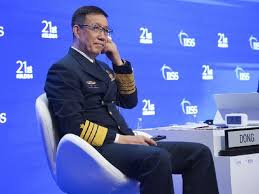At the 21st edition of the Shangri La Dialogue held in Singapore, the new Chinese Defense Minister Dong Jun’s speech has been hailed by Chinese state media as one that calls for peace in the Asia-Pacific region while positioning China as the guardian of that peace initiative.
Introduction to the Shangri La Dialogue
What is the Shangri La Dialogue?
The Shangri La Dialogue is an annual inter-governmental security forum held by the International Institute for Strategic Studies (IISS) which brings together defense ministers, military chiefs, and policymakers from across the Asia-Pacific region. It is a significant platform for discussing regional security issues and promoting cooperation among nations.
Importance of the 21st Edition
This year’s event was particularly noteworthy as it marked the first international security conference appearance of China’s new Defense Minister, Dong Jun. His speech was closely watched by global leaders and analysts, given the current geopolitical tensions in the region.
Dong Jun’s Call for Peace
A Strong Stance on Taiwan
In his address, Dong Jun adopted a strong stance toward Taiwan. He reiterated Beijing’s warnings against Taiwanese independence and lambasted the global backing for it. He stated firmly that Beijing would not permit any nation to “create war or chaos” in the Asia-Pacific region.
Quote from Dong Jun
“Whoever dares to split Taiwan from China will be crushed to pieces and invite their destruction,” Dong asserted, highlighting Beijing’s commitment to “peaceful reunification” with Taiwan, which he said was being undermined by Taiwan separatists and external forces.
Criticism of External Interference
Dong Jun criticized the international support for Taiwan, accusing external forces of exacerbating the situation. He argued that such interference jeopardizes regional stability and peace.
Reactions to Dong Jun’s Speech
Chinese State Media’s Reception
Chinese state media lauded Dong Jun’s speech as a robust call for peace and stability in the Asia-Pacific region. They portrayed China as a responsible power committed to maintaining regional order and preventing conflict.
International Observers’ Perspective
Foreign observers had mixed reactions. Some praised China’s commitment to peace, while others expressed concern over the aggressive rhetoric towards Taiwan and the implications for regional security.
The Taiwan Question
Historical Context
Taiwan, officially known as the Republic of China (ROC), has been a point of contention between Beijing and Taipei since the Chinese Civil War. Beijing views Taiwan as a breakaway province, while Taiwan sees itself as a sovereign state.
Current Tensions
Tensions have escalated in recent years, with Beijing increasing military activities around Taiwan and the international community, particularly the United States, expressing support for Taiwan’s defense.
Dong Jun’s Position on the Philippines
Subtle Attacks on the Philippines
In his speech, Dong Jun also subtly attacked the Philippines, although he did not mention the country by name. This criticism likely stems from ongoing disputes in the South China Sea, where both countries have competing territorial claims.
Implications for Bilateral Relations
Such statements could strain China-Philippines relations further, impacting diplomatic and economic ties. The Philippines has been strengthening its defense partnerships with the U.S. and other allies, adding another layer of complexity to the regional security dynamics.
The South China Sea Dispute
Strategic Importance
The South China Sea is a crucial maritime route, with significant economic and strategic importance. Multiple countries, including China, the Philippines, Vietnam, Malaysia, and Brunei, have overlapping territorial claims in the region.
China’s Claims and Actions
China claims the majority of the South China Sea under its so-called “nine-dash line,” a demarcation that is not recognized by international law. Beijing has built artificial islands and military installations in the contested waters, prompting concerns from other claimant countries and the international community.
The Role of the People’s Liberation Army (PLA)
Military Exercises Around Taiwan
In response to Taiwan’s inauguration and international support, the PLA has conducted large-scale military exercises around Taiwan. These activities are intended to demonstrate China’s military capabilities and deter any moves toward Taiwanese independence.
Beijing’s Justification
Dong Jun defended these exercises, accusing Taiwan separatists of “unilaterally changing the status quo.” He claimed that Taiwan President Lai Ching Te’s inaugural speech “exposed their ambition” to pursue independence.
Peaceful Reunification vs. Military Action
China’s Official Stance
Beijing officially maintains that it seeks peaceful reunification with Taiwan. However, Dong Jun’s rhetoric and the PLA’s military actions suggest that Beijing is prepared to use force if necessary to achieve its goals.
International Concerns
The international community is concerned about the potential for conflict in the region. Any military action by China could have far-reaching consequences, impacting global trade and stability.
Dong Jun’s speech at the Shangri La Dialogue was a significant moment in China’s diplomatic efforts to position itself as a peacekeeper in the Asia-Pacific region. While calling for peace, his strong stance on Taiwan and subtle criticisms of the Philippines highlight the complexities and tensions that continue to shape the regional security landscape. As the Asia-Pacific navigates these challenges, dialogue and diplomacy will be crucial in preventing conflict and promoting stability.




